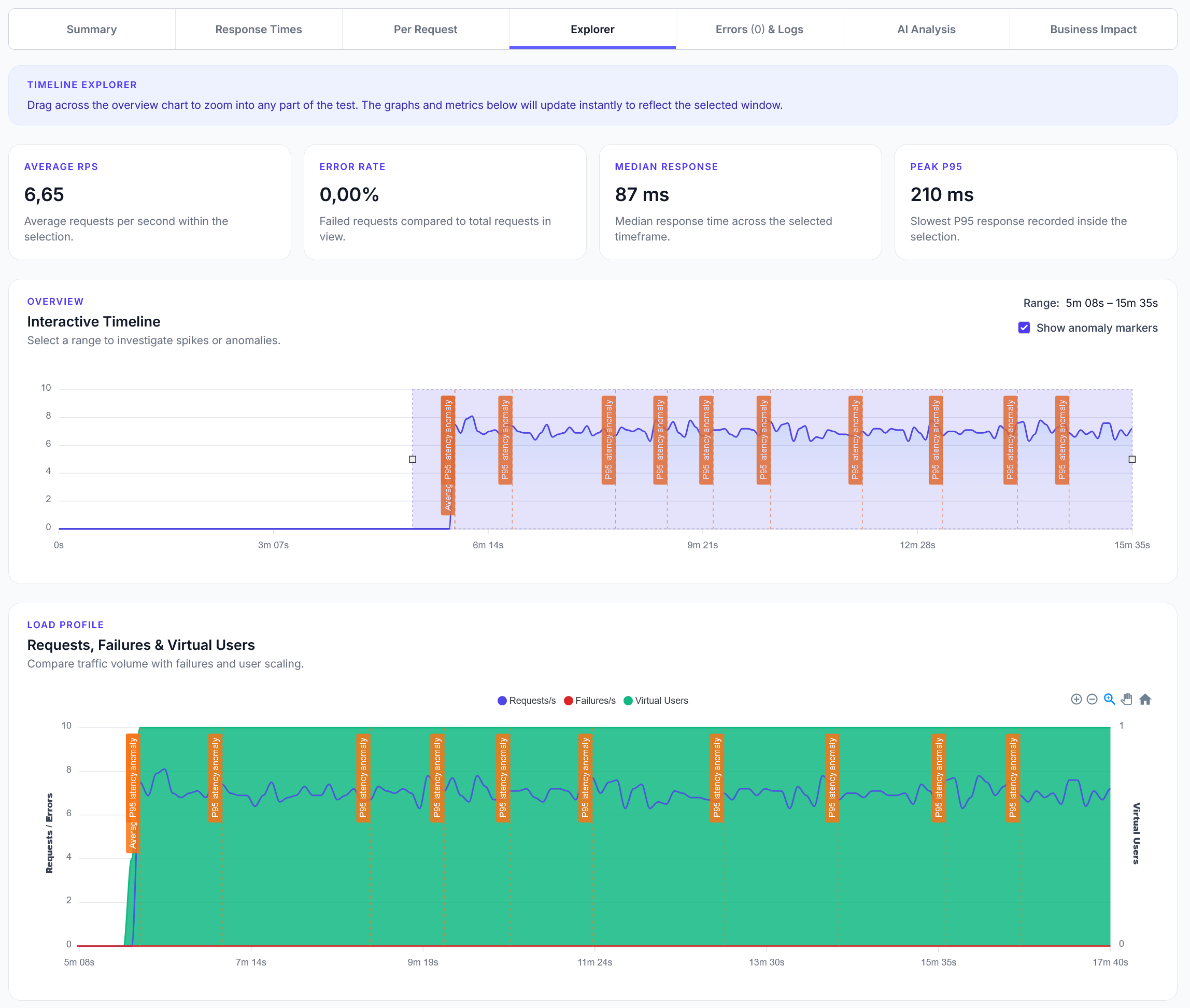
Explorer reports addition
We have added a new Explorer feature to reports, with a timeline scrubber and easy anomaly detection.
Basic cache API testing for Redis, Memcached, and application-level caching performance
LoadForge can record your browser, graphically build tests, scan your site with a wizard and more. Sign up now to run your first test.
This guide shows how to test cache systems with common operations like get, set, delete, and cache invalidation scenarios.
from locust import task, HttpUser
import random
import json
import time
class CacheTestUser(HttpUser):
def on_start(self):
# Cache endpoints
self.cache_endpoints = {
"get": "/api/cache/{key}",
"set": "/api/cache/{key}",
"delete": "/api/cache/{key}",
"flush": "/api/cache/flush"
}
# Test data for caching
self.cache_keys = [
"user_profile_",
"product_data_",
"session_info_",
"config_setting_",
"analytics_data_"
]
# Test values of different sizes
self.test_values = {
"small": {"name": "test", "value": 123},
"medium": {"data": "x" * 1000, "timestamp": int(time.time())},
"large": {"content": "y" * 10000, "metadata": {"size": "large", "created": int(time.time())}}
}
# TTL values for testing
self.ttl_values = [60, 300, 900, 3600] # 1min, 5min, 15min, 1hour
def generate_cache_key(self):
"""Generate a random cache key"""
prefix = random.choice(self.cache_keys)
suffix = random.randint(1000, 9999)
return f"{prefix}{suffix}"
@task(4)
def test_cache_set(self):
"""Test setting cache values"""
cache_key = self.generate_cache_key()
value_size = random.choice(["small", "medium", "large"])
test_value = self.test_values[value_size].copy()
ttl = random.choice(self.ttl_values)
cache_data = {
"value": test_value,
"ttl": ttl
}
set_url = self.cache_endpoints["set"].format(key=cache_key)
with self.client.post(
set_url,
json=cache_data,
name="Cache Set"
) as response:
if response.status_code == 200:
try:
result = response.json()
success = result.get("success", True)
print(f"Cache set: {cache_key} ({value_size}, TTL: {ttl}s)")
if not success:
response.failure("Cache set reported failure")
# Test immediate retrieval
self._test_cache_get(cache_key, expect_hit=True)
except json.JSONDecodeError:
print(f"Cache set: {cache_key} (no JSON response)")
else:
response.failure(f"Cache set failed: {response.status_code}")
@task(5)
def test_cache_get(self):
"""Test getting cache values (mix of hits and misses)"""
# Mix of potentially existing and non-existing keys
if random.choice([True, False]):
cache_key = self.generate_cache_key() # Likely miss
else:
cache_key = f"{random.choice(self.cache_keys)}{random.randint(1000, 1100)}" # Possible hit
self._test_cache_get(cache_key)
def _test_cache_get(self, cache_key, expect_hit=False):
"""Helper method to test cache retrieval"""
get_url = self.cache_endpoints["get"].format(key=cache_key)
with self.client.get(
get_url,
name="Cache Get"
) as response:
if response.status_code == 200:
try:
result = response.json()
hit = result.get("hit", True)
cached_value = result.get("value")
ttl_remaining = result.get("ttl_remaining")
if hit:
print(f"Cache hit: {cache_key} (TTL: {ttl_remaining}s)")
else:
print(f"Cache miss: {cache_key}")
if expect_hit and not hit:
response.failure(f"Expected cache hit but got miss: {cache_key}")
except json.JSONDecodeError:
response.failure("Invalid JSON response")
elif response.status_code == 404:
print(f"Cache miss (404): {cache_key}")
else:
response.failure(f"Cache get failed: {response.status_code}")
@task(2)
def test_cache_delete(self):
"""Test deleting cache entries"""
cache_key = f"{random.choice(self.cache_keys)}{random.randint(1000, 1100)}"
delete_url = self.cache_endpoints["delete"].format(key=cache_key)
with self.client.delete(
delete_url,
name="Cache Delete"
) as response:
if response.status_code in [200, 204]:
print(f"Cache delete: {cache_key}")
# Verify deletion by trying to get the key
self._test_cache_get(cache_key, expect_hit=False)
elif response.status_code == 404:
print(f"Cache delete (not found): {cache_key}")
else:
response.failure(f"Cache delete failed: {response.status_code}")
@task(2)
def test_cache_update(self):
"""Test updating existing cache entries"""
cache_key = self.generate_cache_key()
# First, set a value
initial_value = {"data": "initial", "version": 1}
cache_data = {"value": initial_value, "ttl": 300}
set_url = self.cache_endpoints["set"].format(key=cache_key)
with self.client.post(set_url, json=cache_data, name="Cache Set Initial") as response:
if response.status_code == 200:
# Update the value
updated_value = {"data": "updated", "version": 2}
update_data = {"value": updated_value, "ttl": 600}
with self.client.post(
set_url,
json=update_data,
name="Cache Update"
) as update_response:
if update_response.status_code == 200:
print(f"Cache updated: {cache_key}")
# Verify the update
self._verify_cache_value(cache_key, updated_value)
else:
response.failure(f"Cache update failed: {update_response.status_code}")
def _verify_cache_value(self, cache_key, expected_value):
"""Helper method to verify cached value"""
get_url = self.cache_endpoints["get"].format(key=cache_key)
with self.client.get(get_url, name="Cache Verify") as response:
if response.status_code == 200:
try:
result = response.json()
cached_value = result.get("value")
if cached_value == expected_value:
print(f"Cache verification successful: {cache_key}")
else:
print(f"Cache value mismatch: {cache_key}")
except json.JSONDecodeError:
print(f"Cache verify failed: invalid JSON")
@task(1)
def test_cache_ttl_expiration(self):
"""Test cache TTL expiration"""
cache_key = f"ttl_test_{random.randint(10000, 99999)}"
short_ttl = 5 # 5 seconds
test_value = {"data": "ttl_test", "timestamp": int(time.time())}
cache_data = {"value": test_value, "ttl": short_ttl}
set_url = self.cache_endpoints["set"].format(key=cache_key)
with self.client.post(set_url, json=cache_data, name="Cache Set TTL") as response:
if response.status_code == 200:
print(f"TTL test: {cache_key} set with {short_ttl}s TTL")
# Immediate check (should hit)
self._test_cache_get(cache_key, expect_hit=True)
@task(1)
def test_cache_bulk_operations(self):
"""Test bulk cache operations"""
num_keys = random.randint(3, 6)
bulk_keys = [f"bulk_{i}_{random.randint(1000, 9999)}" for i in range(num_keys)]
# Bulk set
for i, key in enumerate(bulk_keys):
test_value = {"bulk_index": i, "data": f"bulk_data_{i}"}
cache_data = {"value": test_value, "ttl": 300}
set_url = self.cache_endpoints["set"].format(key=key)
with self.client.post(set_url, json=cache_data, name="Bulk Cache Set") as response:
if response.status_code != 200:
response.failure(f"Bulk set failed for key: {key}")
print(f"Bulk set completed: {num_keys} keys")
# Bulk get - retrieve some of the keys
for key in random.sample(bulk_keys, min(3, len(bulk_keys))):
self._test_cache_get(key, expect_hit=True)
@task(1)
def test_cache_statistics(self):
"""Test cache statistics and monitoring"""
stats_url = "/api/cache/stats"
with self.client.get(
stats_url,
name="Cache Statistics"
) as response:
if response.status_code == 200:
try:
stats = response.json()
hit_rate = stats.get("hit_rate", 0)
total_keys = stats.get("total_keys", 0)
memory_usage = stats.get("memory_usage_mb", 0)
print(f"Cache stats: {hit_rate:.1f}% hit rate, {total_keys} keys, {memory_usage}MB")
# Basic validation
if hit_rate < 0 or hit_rate > 100:
response.failure(f"Invalid hit rate: {hit_rate}")
except json.JSONDecodeError:
response.failure("Invalid JSON response")
elif response.status_code == 404:
print("Cache statistics not available")
else:
response.failure(f"Cache statistics failed: {response.status_code}")